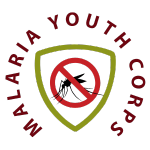Introduction
World Malaria Day is held annually on 25 April. This day is an opportunity to keep malaria high on the political agenda, mobilise additional resources and empower communities.
Since the launch of our first national Malaria Youth Corps in 2021, youth champions across the continent have used World Malaria Day as an opportunity to:
- raise awareness and share malaria prevention information in their communities
- engage other young people and encourage them to join the youth corps and contribute to the fight against malaria
- engage local and traditional leaders and partner with governments and civil society organisations to emphasise the importance of youth engagement in malaria prevention and elimination
In this best practice, we highlight some of the activities youth champions conducted to commemorate World Malaria Day 2024 in:
- Burkina Faso
- Cameroon
- Democratic Republic of the Congo
- Kenya
- Nigeria
- South Sudan
- Tanzania
- Uganda
- Zambia
What are national Malaria Youth Corps?
National Malaria Youth Corps are groups of youth champions aged between 15 and 35. Several African countries have set up national Malaria Youth Corps (Cameroon, Democratic Republic of the Congo, Eswatini, Kenya, Mozambique, Uganda and Zambia). They help support progress on the national malaria strategy and the country’s national malaria control programme.
In addition to contributing to the fight against malaria, youth corps are also involved with defeating neglected tropical diseases and improving access to universal health coverage.
TV and radio interviews, webinars and podcasts
Youth champions have used TV and radio interviews, webinars and podcasts to reach more young people more easily.
Conducting TV and radio interviews
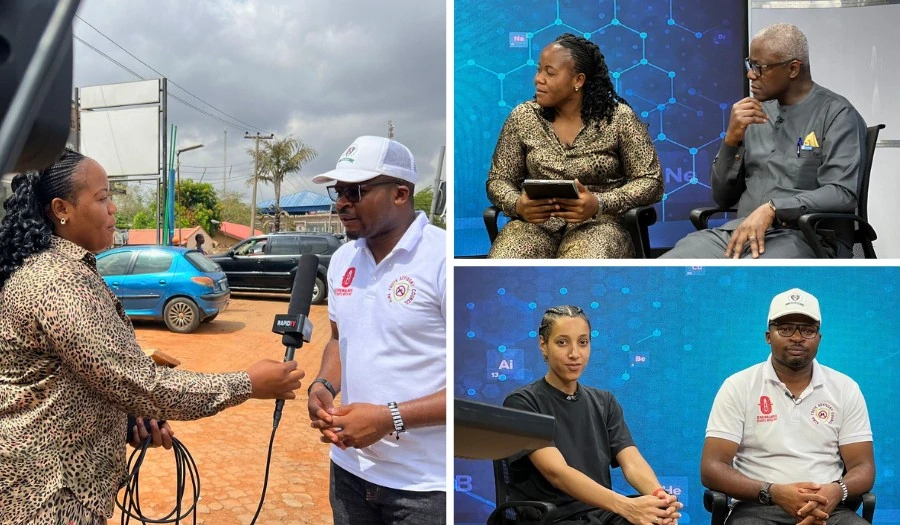
Odinaka Obeta, the ALMA Youth Advisory Council West Africa lead, speaks to Rapid TV in Nigeria, alongside the RBM Partnership to End Malaria CEO, Dr Michael Adekunle Charles and Speak Up Africa representative, Maelle Ba.
The ALMA Youth Advisory Council chairperson, Aloyce Urassa, was interviewed on the radio in a local media house in Tanzania. In addition to highlighting the role of young people, Aloyce discussed the importance of national malaria scorecards and how ALMA supports ministries of health in developing their scorecards.
Odinaka Obeta, the ALMA Youth Advisory Council West Africa lead, participated in a panel discussion on Rapid TV in Nigeria. He was joined by the RBM Partnership to End Malaria CEO, Dr Michael Adekunle Charles and Speak Up Africa representative, Maelle Ba. Odinaka shared insights on celebrating World Malaria Day and how young people can participate in the fight against malaria.
Youth champions in Zambia also took advantage of TV and radio talks, including:
- participating in radio interviews in the Northern, Muchinga and Eastern provinces
- partnering with Q-TV – a television station in Zambia – to feature youth champions on several malaria topics.
Q-TV in Zambia now also provides the Zambia Malaria Youth Corps with two monthly free TV slots to highlight the fight against malaria.
Partnering with civil society organisations to amplify voices
In Burkina Faso and Kenya, the youth corps worked with civil society organisations to amplify their messages.
Youth champions in Burkina Faso organised a webinar with KYNAROU – a local non-governmental organisation – focused on the importance of sanitation in malaria elimination.
Representatives from the Burkina Faso youth champions and KYNAROU discussed:
- ongoing interventions
- the role of youth in dispelling rumours about malaria prevention
- how youth can help create a safer environment
- the importance of blood donations to support people with anaemia, which can be due to malaria
An open discussion followed, addressing how youth can lead in community-level malaria prevention, with particular emphasis on combating misinformation.
The Kenya Malaria Youth Corps partnered with Gavi CSO Constituency and the Zero Malaria Campaign Coalition to host a podcast to discuss the fight against malaria and malaria vaccines. The panel included:
- government officials
- representatives from non-governmental organisations
- community members
Community outreach activities
Promoting the proper use of mosquito nets
Using insecticide-treated nets (ITNs) is an effective way to prevent the spread of malaria and, therefore, reduces illness and death. However, it is essential that nets are hung and used every night.
Youth corps in Cameroon and Zambia used World Malaria Day to show community members how to protect themselves using mosquito nets.
During the week of World Malaria Day, Cameroonian youth champions in the North and East regions worked with community health workers and community leaders to run malaria community outreach activities. These activities included:
- donating mosquito nets, rapid diagnostic tests, hand sanitisers and hygiene materials
- demonstrating how to use the mosquito nets properly
- sharing malaria prevention and control guidance
- emphasising the importance of seeking early treatment upon the first malaria symptoms
The youth champions in Cameroon reached over 130 households, including refugees.
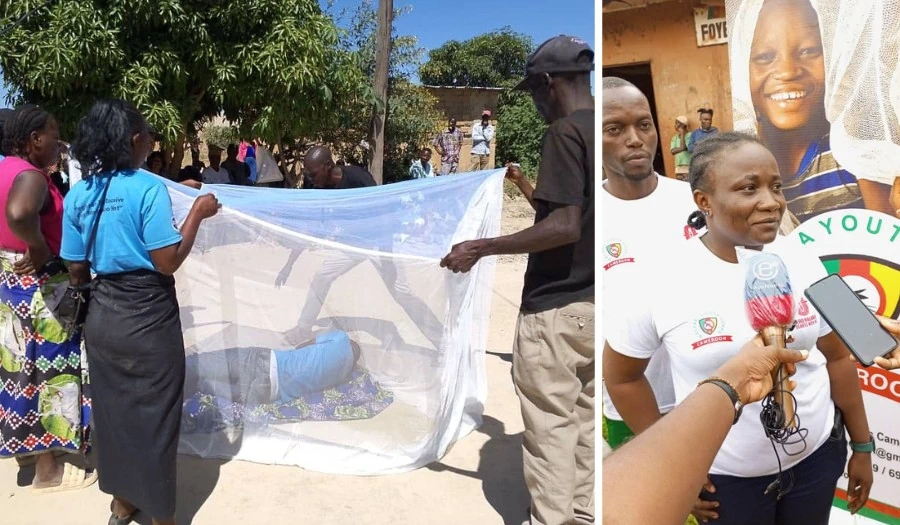
Youth corps in Cameroon and Zambia show community members how to use mosquito nets.
In Zambia, youth champions organised commemoration activities in several districts – including Chongwe, Mazabuka, Isoka and Mkushi. These activities included:
- informing mothers on the importance of mosquito nets and attending clinics during pregnancy
- sharing malaria prevention messaging through the power of art and cultural dances
- visiting community members’ homes to share malaria prevention information
By working with health facilities and community health workers, Cameroonian and Zambian youth champions ensured the malaria prevention information they shared was accurate and trustworthy.
Addressing issues identified in national malaria scorecards
Recently, in Uganda, the malaria scorecard helped to identify underperforming malaria in pregnancy indicators in Iganga district, where:
- a high percentage of pregnant women had malaria (43%)
- only 48% of pregnant women received at least three doses of intermittent preventive malaria treatment (also known as IPTp3)
- only 57% of pregnant women received at least four antenatal care appointments during pregnancy
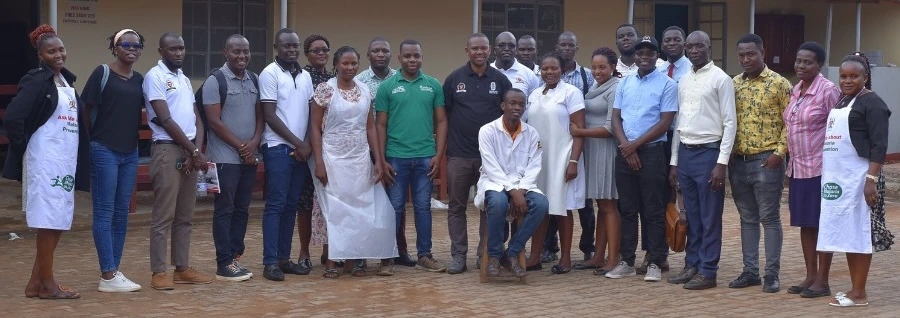
Malaria Youth Champions Uganda working with health workers and community members in the Iganga district.
Malaria Youth Champions Uganda, supported by ALMA and the Uganda Ministry of Health, engaged health workers and community members in the Iganga district to try and resolve this issue by raising the importance of antenatal care and IPTp3 for mothers and their babies.
As the youth champions learnt about scorecards by using the online courses on the Scorecard Hub, they were able to work with the local district health team to:
- demonstrate how the national malaria scorecard works to attendees
- analyse the scorecard data
- discuss the underlying causes of the issues and the importance of data quality
The youth champions then conducted a community dialogue at a local health facility. They spoke to:
- pregnant women attending antenatal care
- a nursing officer and a midwife
- village health team members
These discussions explored the challenges and potential solutions to address underperforming malaria in pregnancy indicators. Uganda Malaria Youth Champions will continue collaborating with health officials in the Iganga district to implement possible solutions.
Participating in official commemorations, health walks, marches and roadshows
Participating in official commemorations such as health walks, marches and roadshows is a great way to reach hundreds of citizens across various communities and engage political leaders.
Official commemorations organised by national malaria programmes
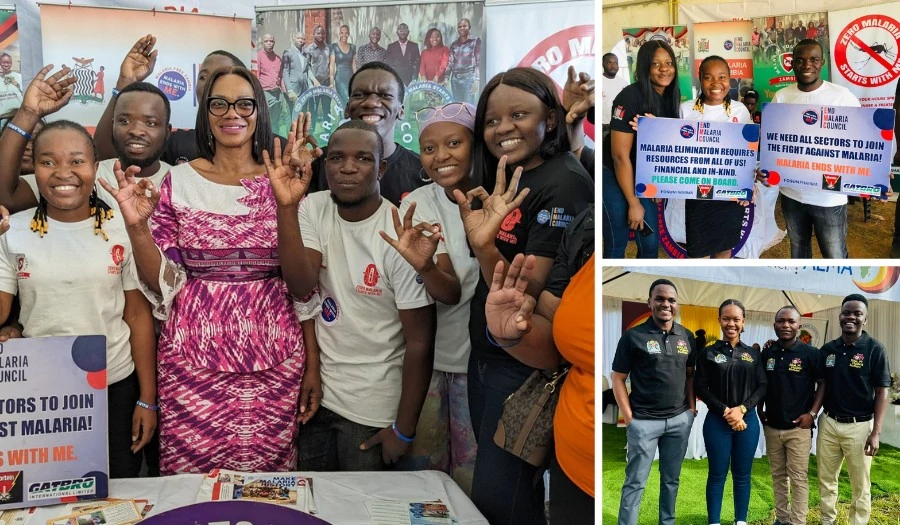
Commemorations for World Malaria Day in Zambia (including the Honourable Sylvia Masebo, Minister of Health) and in Tanzania.
The South Sudan national malaria control programme invited youth champions to the national commemorative event for World Malaria Day. Under the theme of ‘Health Equity, Gender and Human Rights – accelerating the fight against malaria for a more equitable South Sudan’, youth champions were joined by:
- His Excellency Hussein Abdelbagi Akol, Vice President for Service Cluster
- Honourable Yolanda Awel Deng, Minister of Health
- Honourable Dr Ader Macar Aciek, Undersecretary of the Ministry of Health
The Zambian youth corps collaborated with the national malaria elimination programme and the Chongwe community to recognise World Malaria Day. The Honourable Minister of Health led the event and encouraged young people to continue their active role in combating malaria in Zambia.
In Tanzania, youth champions joined the official World Malaria Day commemorations in Tabora, organised by the national malaria control programme. The event welcomed the Honourable Deputy Minister of Health as the guest of honour. The ALMA Youth Advisory Council chairperson, Aloyce Urassa, delivered the keynote remarks on behalf of ALMA Executive Secretary, Joy Phumaphi.
Tanzanian youth champions from the cities of Dar es Salaam, Kigoma, Mbeya, Moshi, Mwanza and Singida – led by Tanzania Malaria Youth Corps lead, Nicolaus Novatus Mukasa – spoke to leaders from the:
- national Ministry of Health
- Tanzania End Malaria Council
- Tanzania Parliamentarians Against Malaria (TAPAMA)
The youth champions discussed community mobilisation strategies and how young people can contribute to the fight against malaria.
Roadshows
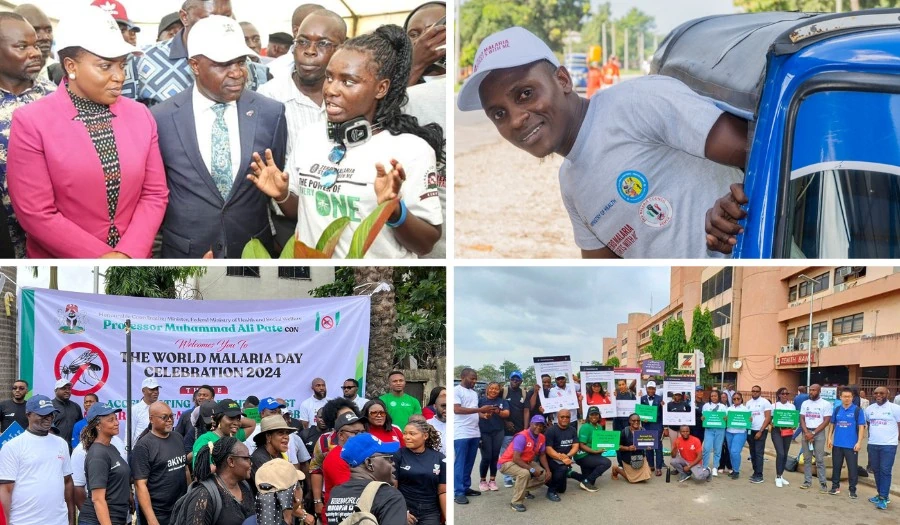
Kenyan and Nigerian youth champions take part in malaria roadshows. Kenya Malaria Youth Corps were joined by Nakhumicha S Wafula EGH, Cabinet Secretary, Ministry of Health and H.E. Dr Mathew Ochieng Owili, Deputy Governor of Kisumu County.
In Nigeria, Odinaka Kingsley Obeta, the ALMA Youth Advisory Council lead for West Africa, joined the Nigeria Malaria Youth Corps lead, Given Promise, at a roadshow and ministerial press conference in Abuja. The national malaria elimination programme organised the event under the theme ‘Accelerating the fight against malaria for a more equitable world.’
The Kenya Malaria Youth Corps collaborated with the End Malaria Council of Kenya for a public outreach roadshow. They engaged communities and shared malaria prevention messaging in two malaria-endemic counties, Siaya and Kisumu.
Health walks and marches
Health walks and walks took place in Uganda and Cameroon as part of the official World Malaria Day commemoration events.
Ugandan youth champions participated in a ‘Walk against Malaria’ event organised by Malaria Free Uganda (the End Malaria Council in Uganda), the Ugandan Ministry of Health, and the Uganda Parliamentary Forum on Malaria. The Right Honourable Thomas Tayebwa, deputy speaker for the Parliament of the Republic of Uganda, led the walk, which raised malaria awareness and encouraged blood donations.

Malaria Youth Champions Uganda participate in a health walk, with country lead, Dr Ismail Munyamu, delivering a speech to the crowd.
While in Cameroon, the youth champions joined over 600 people who attended the official commemorations and advocacy march event hosted by the Honourable Minister of Public Health.
Engaging specific groups in the fight against malaria
Engaging university students
The Cameroon Malaria Youth Corps led outreach activities at the Catholic University of Cameroon, where they trained students on using malaria rapid diagnostic tests and tested over 30 people who had malaria symptoms.
Kenyan youth champions took part in a summit organised by students from the African Leadership University. The Kenya Malaria Youth Corps lead, John Mwangi, provided opening remarks, and other youth corps members informed students about malaria prevention and elimination.
Leading community discussions at local schools and health facilities
Zambian youth champions in Kanchibiya district, Muchinga, led community discussions on malaria prevention at Mpepo Primary School. To make sure the event was impactful, the youth champions invited:
- community members from several nearby villages
- the local ward councillor, mayor and council secretary
- environmental health technologists from the local rural health post
The youth champions explained how to use insecticide-treated bed nets correctly and discussed resource mobilisation with local authorities.
Working with hospitals and orphanages
Along with reaching students, youth champions in the Democratic Republic of the Congo also visited hospitals and orphanages in several provinces. During these visits, the youth champions:
- raised awareness about the danger posed by malaria in DR Congo, the second most-affected country on the continent
- cleaned public areas
- donated food and other items
Through these activities, DR Congo youth champions reached 5,000 people, including in the cities of Kindu, Lubumbashi, Kabinda and Kasai. The youth champions also reached marginalised groups, including school-aged children, women in religious settings and those detained in prisons.
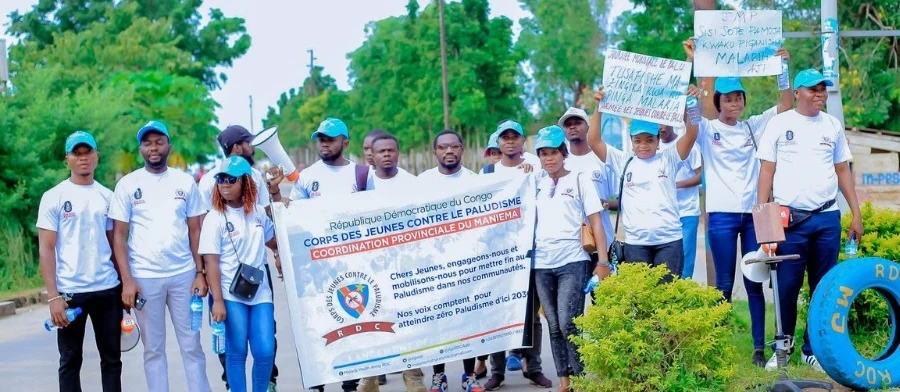
Youth champions from the Democratic Republic of the Congo.
Collaborating with the private sector
Malaria Youth Champions Uganda participated in a scientific colloquium organised by the Ministry of Health and engaged with pharmaceutical companies and other scientific businesses. The youth champions showcased their participation in seasonal malaria chemoprevention campaigns.
During the commemorations, the Zambia Malaria Youth Corps established partnerships with First Quantum Minerals and the US President’s Malaria Initiative.
First Quantum Minerals is an important partner of Zambia’s End Malaria Council and plans to work with the youth champions in the North-Western province. The US President’s Malaria Initiative in Zambia is also exploring how it can collaborate with the youth corps.
Recruiting new youth corps members
In Tanzania and Zambia, youth champions used World Malaria Day activities to encourage fellow young people to join their national Malaria Youth Corps.
During commemorations in Tabora, youth champions from Tanzania managed an ALMA information booth where they could emphasise the critical role they are playing in the fight against malaria with prospective youth champions. The youth champions signed up 70 young people, and these recruits will receive training in community mobilisation to support the work of the national malaria control programme.
In Zambia, leaders of the national Malaria Youth Corps trained 20 recruits in Chongwe district. This training is part of their efforts to establish a youth corps movement in the district. The training included:
- an introduction to malaria
- community engagement strategies
- the use of the ALMA Scorecard Hub and training materials
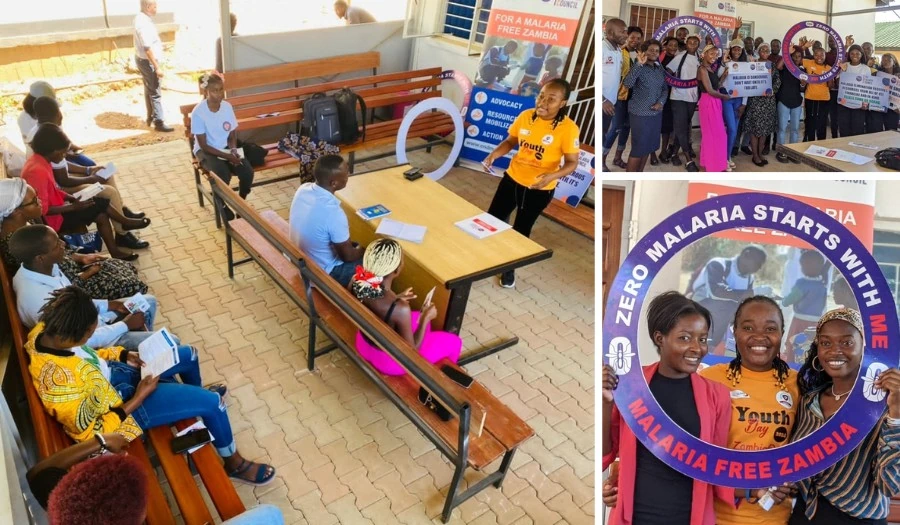
New youth corps recruits in Zambia participate in training in Chongwe district.
Conclusion
Several national Malaria Youth Corps and hundreds of youth champions across Africa leveraged World Malaria Day 2024 to engage in various activities to enhance efforts against malaria, including:
- sharing malaria prevention messaging on TV and radio interviews, webinars and podcasts
- leading community outreach activities
- addressing issues identified in national malaria scorecards
- participating in official commemorations, health walks, marches and roadshows to spread awareness of malaria
- engaging specific groups in the fight against malaria, including students, hospitals and health facilities, orphanages and the private sector
- engaging local leaders including traditional leaders and support them on how they – in their positions in the communities – can contribute to the fight against malaria
- recruiting new youth corps members
Through these continued engagements, national Malaria Youth Corps are setting a precedent for African youth to play a leading role in defeating malaria across the continent.
